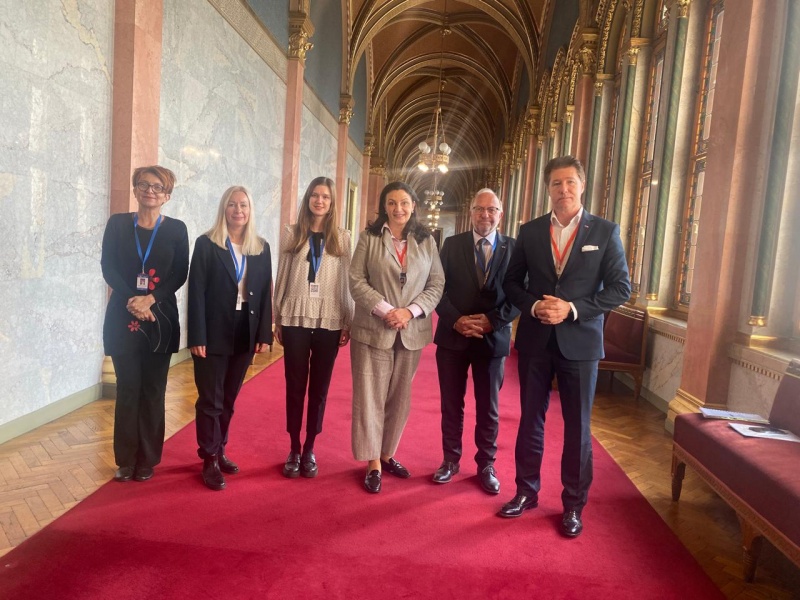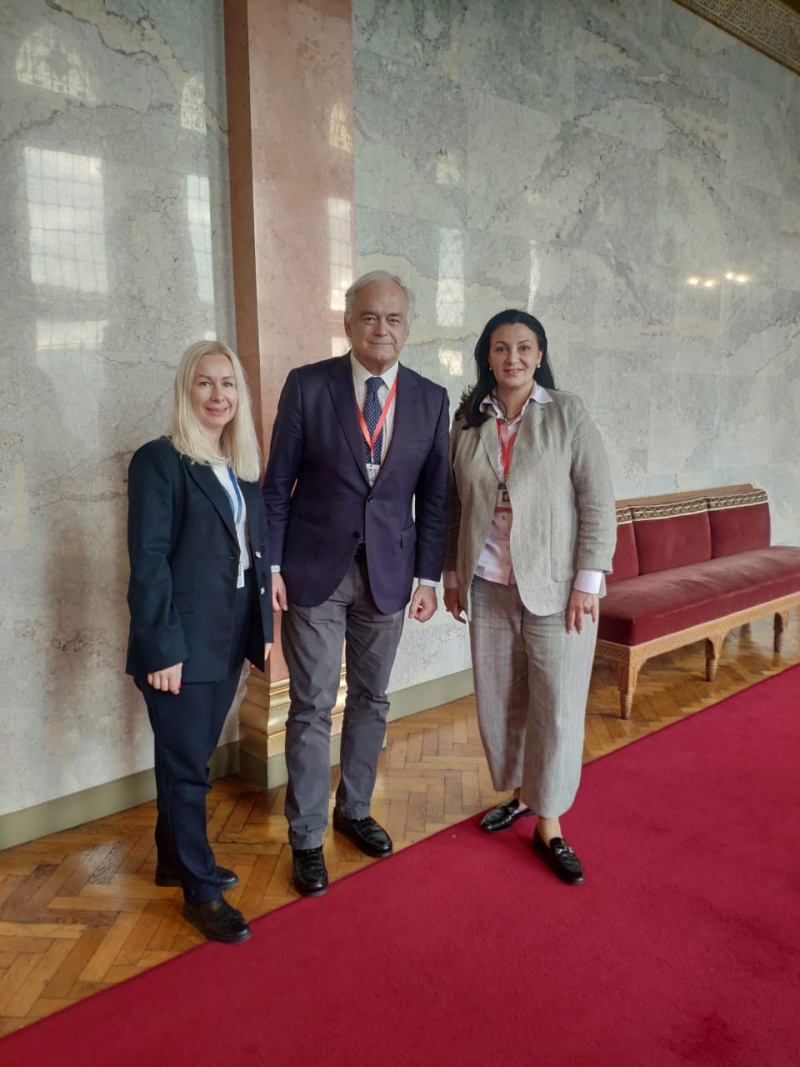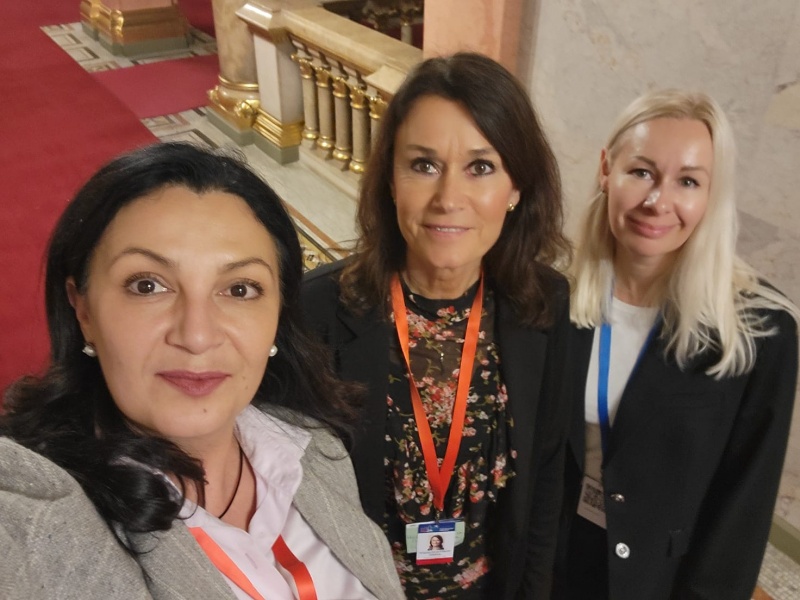
The Chair of the Committee on Ukraine’s Integration into the EU, Ivanna Klympush-Tsintsadze, and Committee member Olena Vintonyak held bilateral meetings on the sidelines of the Conference of the Parliamentary Committees for European Affairs of Parliaments of the European Union and on European Integration of Partner and Candidate Countries (COSAC) in Budapest. They met with the parliamentary delegation of Slovenia, headed by the Chair of the Committee on European Affairs, Franc Breznik; the Vice-President of the European Parliament, Esteban González-Pons; the parliamentary delegation of Denmark, headed by the Chairwomen of the European Affairs Committee, Brigitte Klintskov Jerkel; and with the delegation of the Netherlands, headed by the Chair of the Committee on the Senate (Upper House) of the Netherlands, Bastiaan van Apeldoorn.
During these meetings, Ivanna Klympush-Tsintsadze and Olena Vintonyak discussed the military and financial support for Ukraine, the energy crisis in Ukraine caused by the Russian Federation's attacks, European integration, as well as advocacy efforts to engage with politicians and societies where support for Ukraine is not a high priority.

“European colleagues were interested in the situation in Ukraine — both on the frontlines and in the energy sector. All countries and the Vice-President of the European Parliament assured us of their continued support for Ukraine,” reported the Chair of the Committee on Ukraine's Integration into the EU. According to her, Europe is aware of emerging narratives and calls for negotiations with the Russian Federation. “ European societies have also become somewhat accustomed to the war in Ukraine. There is no longer the same emotional, comprehensive attention to events on our territory. This is partly due to reduced media coverage of the war, Ukraine’s needs, and real human stories. Everyone agrees that this situation is unacceptable,” concluded Ivanna Klympush-Tsintsadze.
The Vice-President of the European Parliament, according to her, assured that both he and the President of the European Parliament, Roberta Metsola, would continue to work with the European Parliament to increase support for Ukraine. “They intend to build on significant actions taken by the European Parliament in the previous convocation to assist Ukraine,” noted the Chair of the Committee. At the same time, European colleagues are closely monitoring the elections in the United States, as their results will determine how the security dimension of interaction between Europe and the United States will develop.
Regarding European integration, Ivanna Klympush-Tsintsadze and Olena Vintonyak expressed hope that negotiations on the first cluster would open soon. “European integration is an opportunity for the transformation of the country. We very much hope that we will use the opportunities it presents,” said the Committee Chair. At the same time, according to her, European colleagues, particularly from the Netherlands, emphasised that this is a long process that should be merit-based. “They will meticulously analyse our ability to fulfil the requirements that are fundamental and mandatory for candidate countries. We need to be aware of this and do our homework,” said the Chair of the Committee on Ukraine’s Integration into the EU.

Ivanna Klympush-Tsintsadze and Olena Vintonyak invited colleagues who had not yet visited Ukraine since the full-scale invasion. "We have repeatedly witnessed how the personal position of politicians changed after they had visited Ukraine. “We invited them to come and gain additional arguments for themselves, governments of their states, and their societies to strengthen support for Ukraine,” the Chair of the Committee concluded.
During these meetings, Ivanna Klympush-Tsintsadze and Olena Vintonyak discussed the military and financial support for Ukraine, the energy crisis in Ukraine caused by the Russian Federation's attacks, European integration, as well as advocacy efforts to engage with politicians and societies where support for Ukraine is not a high priority.

“European colleagues were interested in the situation in Ukraine — both on the frontlines and in the energy sector. All countries and the Vice-President of the European Parliament assured us of their continued support for Ukraine,” reported the Chair of the Committee on Ukraine's Integration into the EU. According to her, Europe is aware of emerging narratives and calls for negotiations with the Russian Federation. “ European societies have also become somewhat accustomed to the war in Ukraine. There is no longer the same emotional, comprehensive attention to events on our territory. This is partly due to reduced media coverage of the war, Ukraine’s needs, and real human stories. Everyone agrees that this situation is unacceptable,” concluded Ivanna Klympush-Tsintsadze.
The Vice-President of the European Parliament, according to her, assured that both he and the President of the European Parliament, Roberta Metsola, would continue to work with the European Parliament to increase support for Ukraine. “They intend to build on significant actions taken by the European Parliament in the previous convocation to assist Ukraine,” noted the Chair of the Committee. At the same time, European colleagues are closely monitoring the elections in the United States, as their results will determine how the security dimension of interaction between Europe and the United States will develop.
Regarding European integration, Ivanna Klympush-Tsintsadze and Olena Vintonyak expressed hope that negotiations on the first cluster would open soon. “European integration is an opportunity for the transformation of the country. We very much hope that we will use the opportunities it presents,” said the Committee Chair. At the same time, according to her, European colleagues, particularly from the Netherlands, emphasised that this is a long process that should be merit-based. “They will meticulously analyse our ability to fulfil the requirements that are fundamental and mandatory for candidate countries. We need to be aware of this and do our homework,” said the Chair of the Committee on Ukraine’s Integration into the EU.

Ivanna Klympush-Tsintsadze and Olena Vintonyak invited colleagues who had not yet visited Ukraine since the full-scale invasion. "We have repeatedly witnessed how the personal position of politicians changed after they had visited Ukraine. “We invited them to come and gain additional arguments for themselves, governments of their states, and their societies to strengthen support for Ukraine,” the Chair of the Committee concluded.
More posts by topic
“News”
24 November 2025 13:08
20 November 2025 16:14
18 November 2025 12:57
13 November 2025 12:34
12 November 2025 12:31
09 November 2025 12:27
17 October 2025 16:54
15 October 2025 16:52
13 October 2025 16:50
10 October 2025 16:47